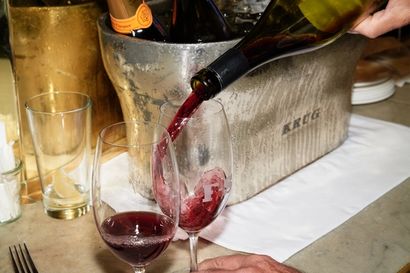The best Japanese restaurants in London
Gleaming omakase restaurants, kaiseki spots filled with a sense of stillness, and lively izakayas – these are the places whose food seems to be whisked straight from a Miyazaki
The British fascination with Japanese cuisine has done much to improve the island’s access to mouth-burning ramen, cool slips of soba, a saving’s-worth of nigiri, and the beautifully choreographed rhythms of kaiseki fare. In London, where the promise of raw fish and slices of fried pork knows no bounds, the options are superb. Here are a few of our favourite destinations…
Aragawa
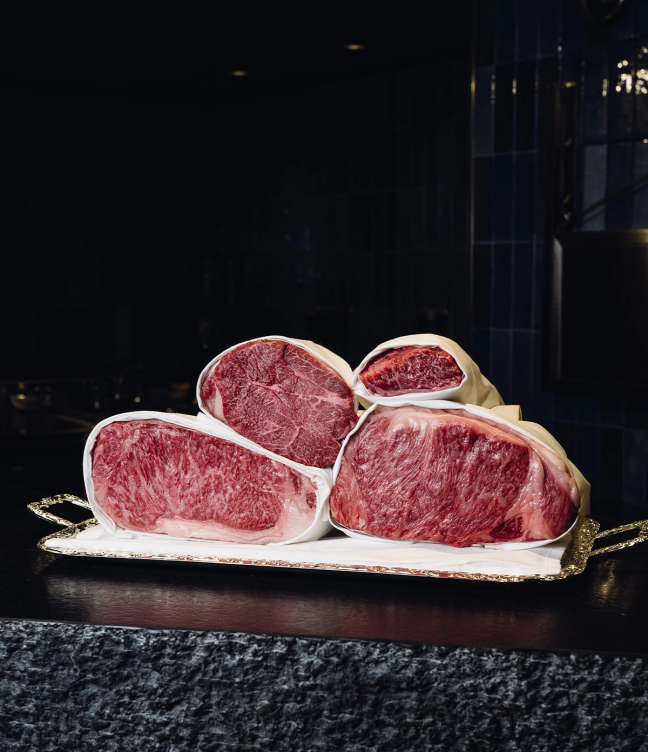
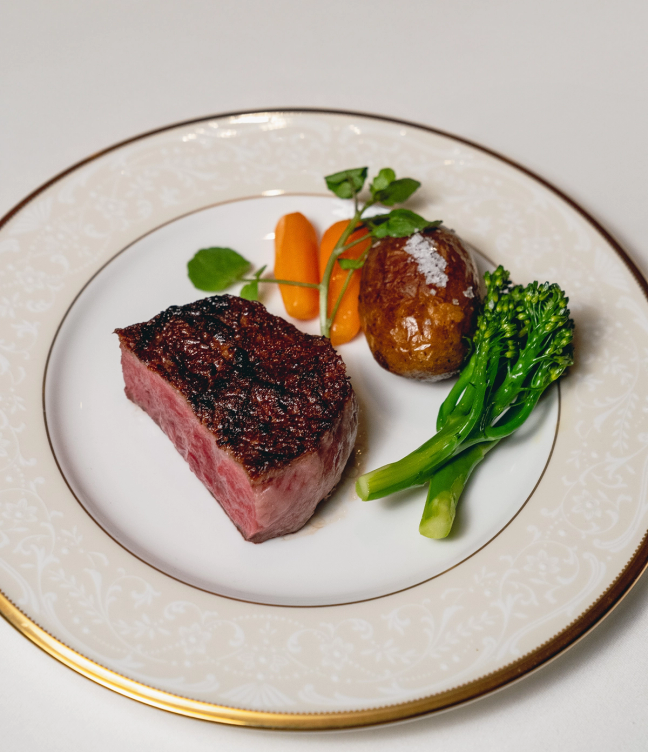
In Japan, the reverence for food and dining is unmatched across the world, with the exception, perhaps, of Mexico City and San Sebastián. The convenience stores are teemed up with superb fried chicken and sandos that’ll satisfy late-evening hunger, and fish is still widely handled with the respect a jeweller gives to the rarest stones. Some school children often begin their lunch in silence, to focus on the bowls of sustenance in front of them, and you might have heard of the hard-to-find restaurants where entry is invite-only. Aragawa, the Mayfair export of the Tokyo legend, operates on this sort of privacy level; there are only around three tables a night, press coverage has been at a minimal, and once you’re in – and have acted like any good diner should – you’ll be welcomed back.
You’ll have no doubt heard about the steak at play and its price tag (cuts start from about £190 per 100g) – but to discuss the cost is besides the point. The Tajima meat – what many consider the most coveted on the market – is sourced from the Hyogo prefecture, whose capital, Kobe, is the nerve centre of the beef universe. The restaurant makes use of a few small farms throughout the year, and the cows that are bred on those lands could be considered to be some of the most cosseted beasts on Earth, with their diet of hay and specially formulated grains and their access to mineral water that comes from springs located deep beneath the ground. In winter, they wear specially knitted jackets. Their lineage is well documented. They are truly loved by the farmers who rear them. In short, these heifers have a better existence than you and I.
So, you’ll turn up to Clarges Street, and you might walk past the restaurant a few times until you finally locate the discreet entryway. You’ll be shown the modest-size but properly curated wine cabinets. The private dining room has the serene discretion of a hushed ryokan. And you’ll head down the staircase to the tables below. Chef Kazuo Imayoshi, a shokunin of the grill who did more than four decades at the Tokyo mothership, will likely be waiting in the open kitchen to welcome you, and you’ll be ushered to one of the plush semi-circular booths. Depending on how the stars align, there might be Scottish smoked salmon whose lightness may bring to mind the Troisgros approach to cooking the orange-flesh fish; the snow crab salad is composed of baby gem lettuce on a spread of avocado purée and a streak of yuzu; and the consommé – we advise that you add this to your game plan – is made from the signature meat and coats the mouth like an excellent Cognac. But everyone there knows you’ve travelled for the beef, which is sliced (250g should suffice), speared, and sprinkled generously with salt and ground pepper. The cut is placed over smouldering charcoal – the batons of binchotan with which Imayoshi cooks exude no signs of smoke, such is their purity – and the oven door is shut. There are ten temperatures to which your steak can be done, and just by listening to how fast the fat drips, the chef can tell when the cooking is complete. And there it is in front of you, a glossy-sheened meat with a few great potatoes, seasonal vegetables and grapes positioned on the plate’s perimeter. The crust is formed like golden bark, and the middle is of a light pink, interrupted only by the almost translucent channels of fat that streak through it. The profound texture is comparable to chewing thick butter. And the taste is that of an animal that was completely adored. Take your time, but it might be impossible not to inhale it all; this could well be the best evening of food you’ll have in your lifetime.
Sumi
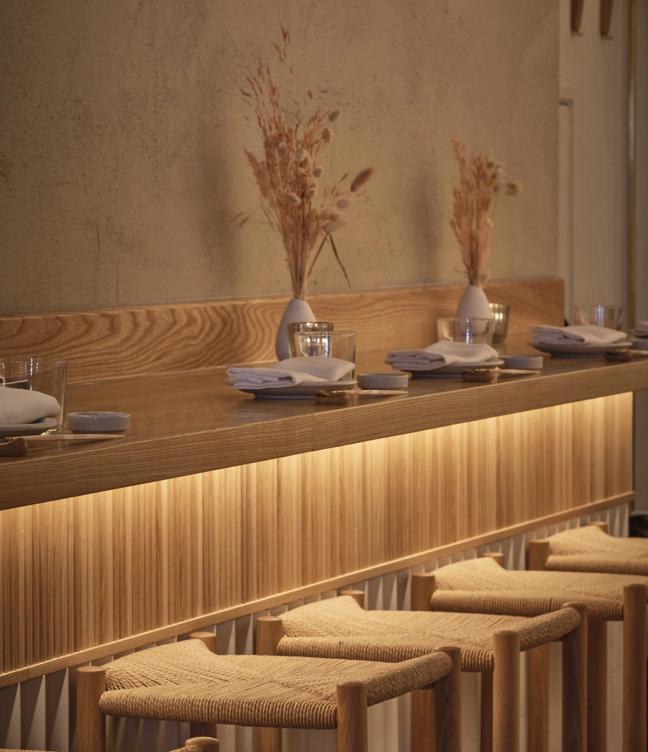
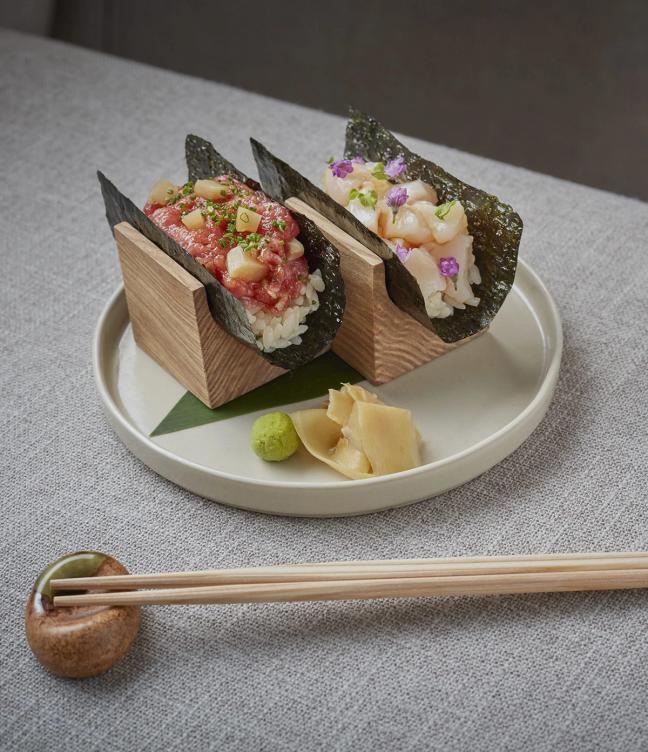
The o-toro nigiri at Sumi is an item of pure lust, the juiciest section of meat hewn from the belly of a tuna, slashed with razor precision under a yanagi into a gridded pattern so that it drapes loosely over a small mound of vinegared rice, glinting with the soft lustre of satin and dabbed with a fingertip of wasabi. It’s the kind of combination that has Tokyo sushi-masters awake at the break of dawn and up until the darkest hours of the night.
Endo Kazutoshi is a gifted chef and his dishes are probably the closest you’ll get to Ginza without leaving Heathrow – his hotate temaki crackles with thin nori sheets and is jammed with diced scallops and small buds of shiso flowers; and his yellowtail has a toasted hit that’ll long linger in the mouth – but you will always return for his gleaming o-toro.
Koya Ko Hackney
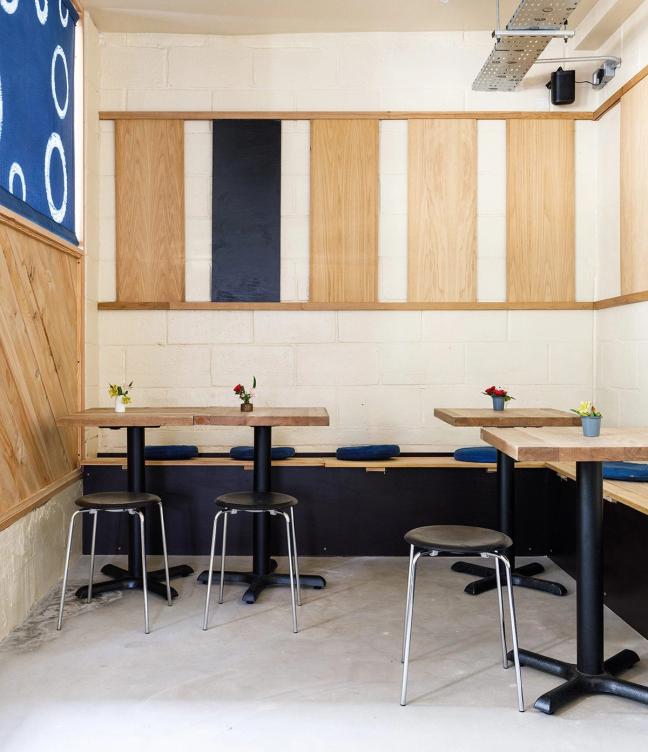
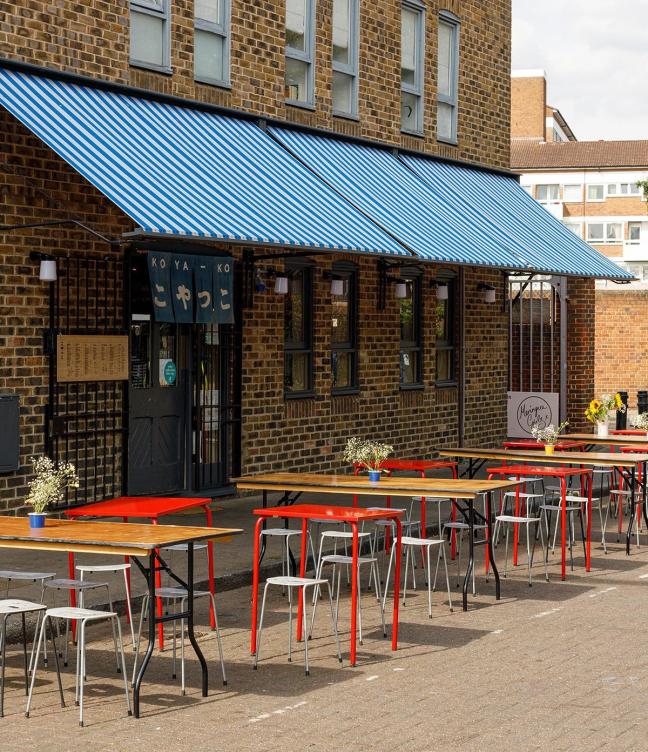
There are few greater pleasures than the hedonistic cooking found in Koya Ko, the cramped udon house that offers shelter from the Birkenstock-saturated crowds congesting east London’s Broadway Market. Bowls of vegetable tempura and marinated-and-fried chicken karaage are fine ways to line your appetite, the type of lightly sizzled dishes favoured by those looking to steady fragile morning-after heads – but you’re only really there to crush a bowl of udon, the thick wheat-flour noodle that sits at the blurred intersection between soba’s stripped-back purity and the high-octane thrill of lava-hot ramen.
The curry udon here shows the more combative side of the Japanese pantry, a dish that’ll have you investing five minutes tussling with chunky tentacles of dough that’ve been shaped to the thickness of Roman-standard pici and boiled to the soft, chewy give of cheung fun – though, you may barely see them under the murky sauce in which they’re submerged. An extra £3.30 will get you a tamago egg, an essential addition that’ll enhance the beautiful, chaotic moshpit in front of you.
Roketsu
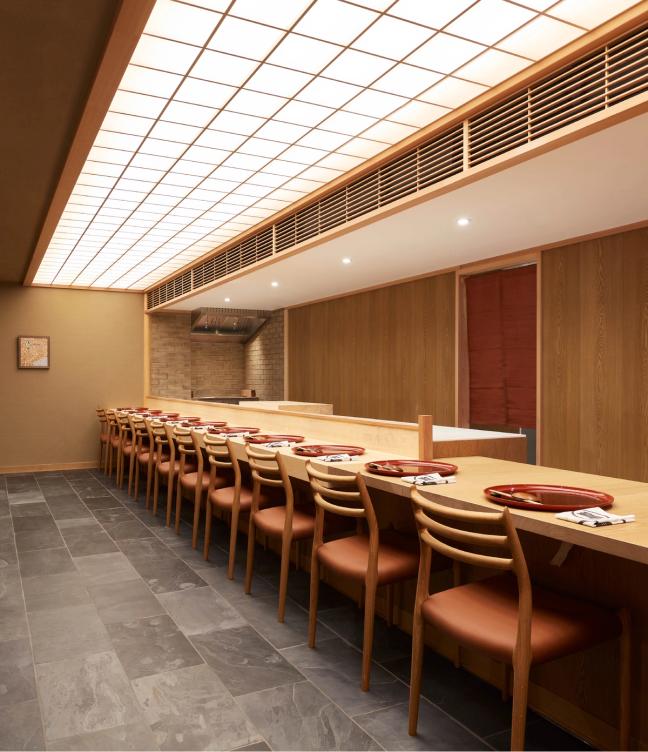
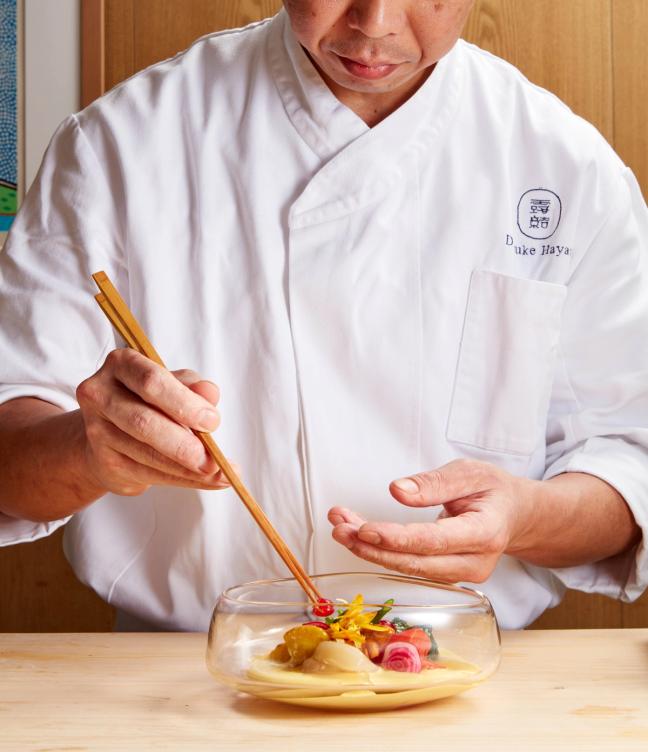
Kaiseki – Japanese cooking’s highest expression of eating with the seasons – is what many have cited as the key influence behind the multi-course tasting menu that the likes of El Bulli and Noma popularised in recent decades. It has roots in past centuries, and it has the smooth flow of water over pebbles. Spring may bring flounder; summer always sees tomatoes; mushrooms are a big feature in autumn; and winter calls for daikon and hamachi. Kikunoi, the Kyoto standard-bearer in the field, is where chef Daisuke Hayashi trained and was educated in the rhythms of nature, learning the fundamentals of cooking and plating small, naturalistic ecosystems of food onto plates and into palm-size bowls.
His 10-seat Marylebone restaurant, which opened silently in 2022, specialises in this highly choreographed meal and may be as close as Londoners can come to the model within the confines of the continent. A hollowed-out clementine is refilled with a tofu and miso made of the citrus fruit. Layers of toro are sandwiched by a raw egg yolk and a balancing installation of black truffle. A gentle kaburamushi of red mullet, ginkgo and turnip may be there one day and gone the next. There could be a kibako whose compartments are filled with lotus root stuffed with Japanese mustard and paired with kumquat cooked in syrup; simmered carrot shaped like a plum flower; and bottarga wrapped in Cornish squid – the chef may even present you with a hand-drawn diagram of the presentation. A hushed tone is standard, the dining room is spartan, and the menu will begin at little under £200. And, if the stars align, you could be given your own onigiri to take home.
Sushi Kanesaka at 45 Park Lane
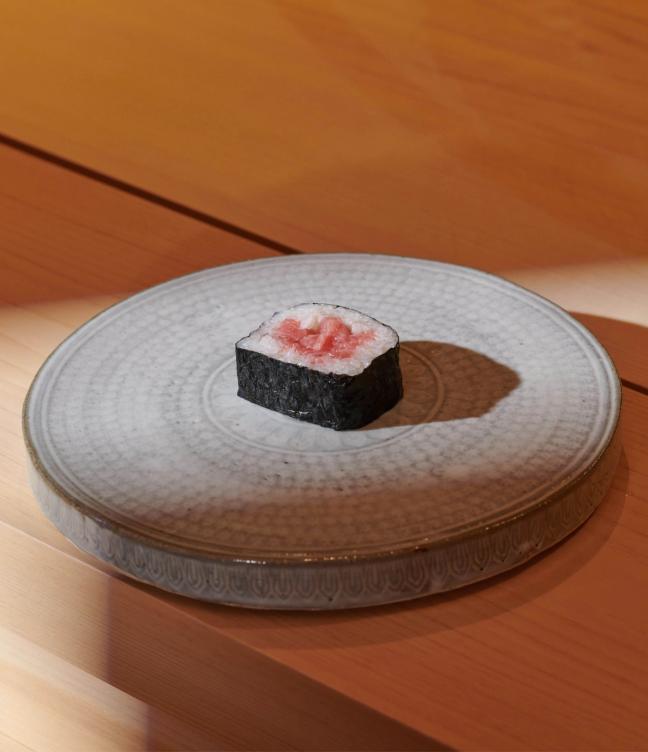
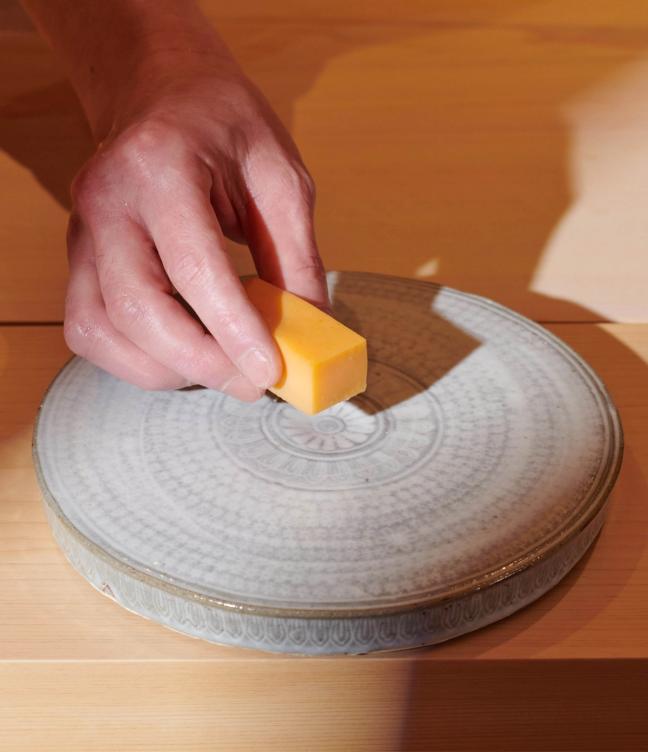
Everything you hope for at a Japanese omakase is, somehow, all there on Park Lane: the counter hewn from a single block of hinoki wood, the rigid lineup of bentwood chairs, the shoji screens that at once let a soft light in but also create a firewall between the outside world and the soft joys of the dining room, the quiet grace of the yanagi slashing through long slabs of tuna. Every bite of vinegared rice, wasabi and fish is suspended for just a split, blissed-out second.
Depending on your day, there might be grouper with a wash of irizake sauce, made by mixing sake with bonito flakes and pickled plums; an arrangement of ghost-white squid sushi, spooned with a little hit of beluga caviar; and a bowl of tile fish that’s been steamed and then placed within its own soup. Head chef Hirotaka Wada, once the lead at Sushi Kanesaka Palace Hotel Tokyo, dictates the rhythm, slicing fish – smash-hits, such as o-toro, and lesser-coveted cuts, too, such as the umami-rich alfonsino and the oily glories of mackerel – with movements that seem as fluid as the cycles of nature, moulding rice into small bricks, massaging wasabi root on sharkskin. There will likely be a sous who parades a plate of Kobe beef, before it’s grilled on the binchotan until its upper inches are browned and the inside remains crimson. The eyes, inevitably at that point, roll towards the back of the head.
Kioku by Endo
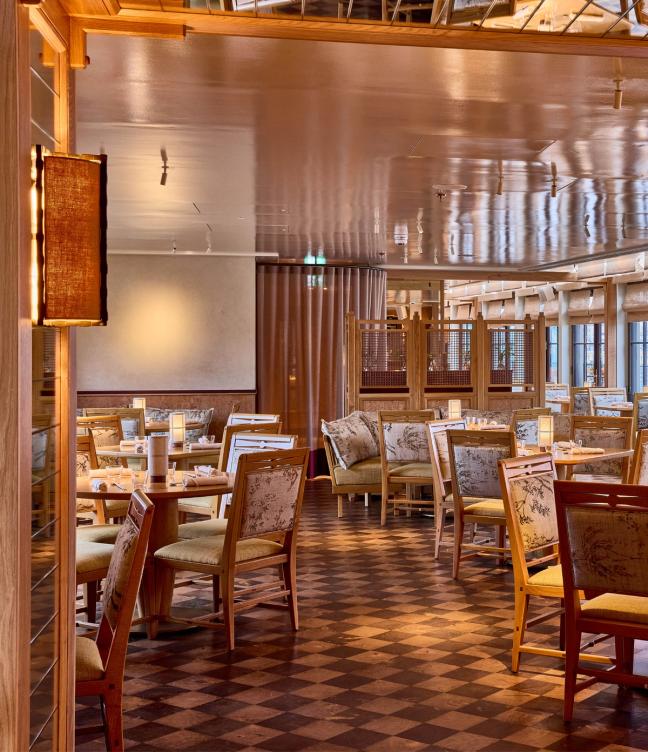
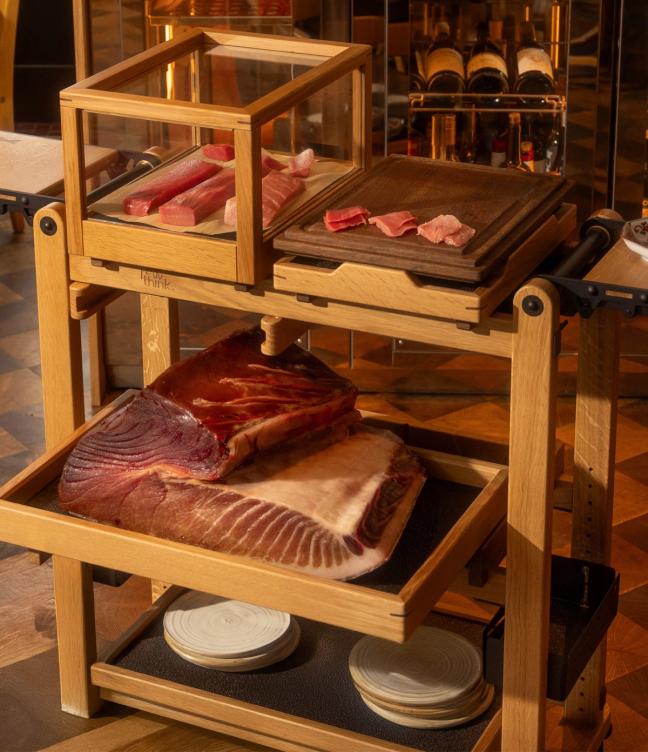
Ever since his omakase restaurant landed on the eighth floor of White City’s Television Centre – a flowing landscape of hinoki and first-rate produce – Endo Kazutoshi has been the paragon of Japanese dining in the country. Kazutoshi is a man known in equal parts for his lyrical style, his feel for lustworthy dishes – Japanese A4 Wagyu sirloin; chopped yellowtail temaki – and his ability to cater to several tastes: his casual diner, Sumi, is perfect in its easygoing neighbourhood rhythms; Nijū, which launched on Berkeley Street in 2024, does a fantastic grill selection.
If you happened to be within reaching distance of an Instagram reel in the past year or so, you’ll be well acquainted with the chef’s arrival atop The OWO, an in-demand destination where he mixes Japan and the Mediterranean. Small wrappers of sweet agnolotti are inserted with ox cheek and the flavours of buckwheat tea, and there’s white-crab tagliolini with shiso butter and brown-crab miso. Lobster is positioned on a small mound of fregola – the chewy pasta bead of the Sardinian household – and is fragranced with kinome leaf and sansho pepper. For the purists, there’s bluefin tuna in sashimi form, as a tartare, and aged like charcuterie. Just don’t overlook the ground-floor bar, where the playlist and the sake are impeccable.
The Aubrey
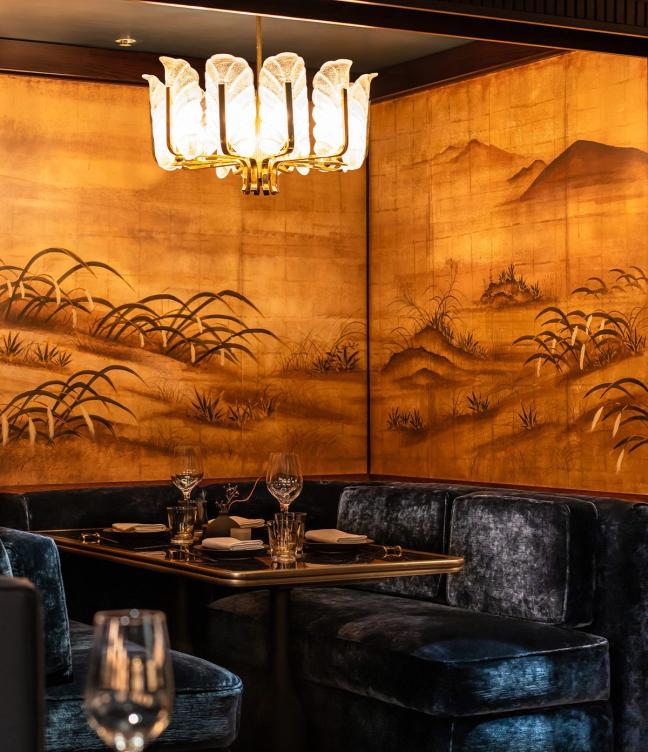
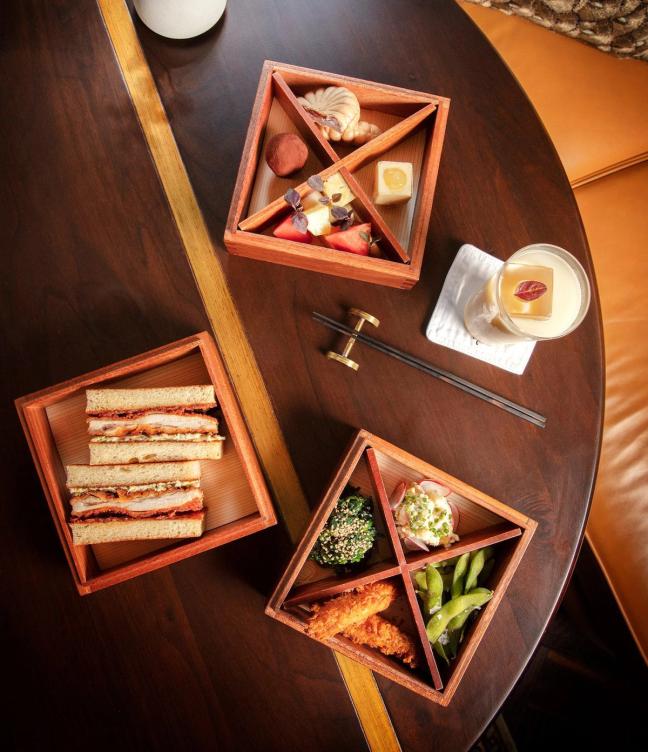
You’ll book an evening slot at The Aubrey, the Mandarin Oriental’s maximalist take on an izakaya, and you’ll make your way to the high-roller streets of Knightsbridge. You’ll avoid the temptation of making a beeline for three courses in Heston’s dining room (you may fail!), push through the noren – door curtain – and you’ll dizzy yourself with the splashy warren of rooms ahead: swathes of pink, dark parquet flooring, flashes of blue leather, mise-en-scènes in the kacho-ga style pinned to the walls, and areas festooned with plush green banquettes calling for your occupancy.
Izakayas in Osaka tend to go the way of the informal: late-night inebriation, elbow-to-elbow chatting, small, inexpensive dishes that are just made for a pleasurable time with alcohol, and the odd spill of sake from the salarymen next to you. At The Aubrey, you’ll order ornate platters of umami-rich sushi pressed with Hokkaido rice; insurmountable plates of fried rice tossed around with Wagyu oxtail and lifted by the funky pungency of bone marrow; and your eyes will roll backwards for the Wagyu sando, a statement inch or two of pink meat, moistened with a bit of house-style Kewpie and tonkatsu sauce, bookended by bread that’s equally thick and toasted to a fried, tanned crust, and cut up four ways. It may be better to interpret The Aubrey as a sort of izayaka flying on Concord.
Koyn
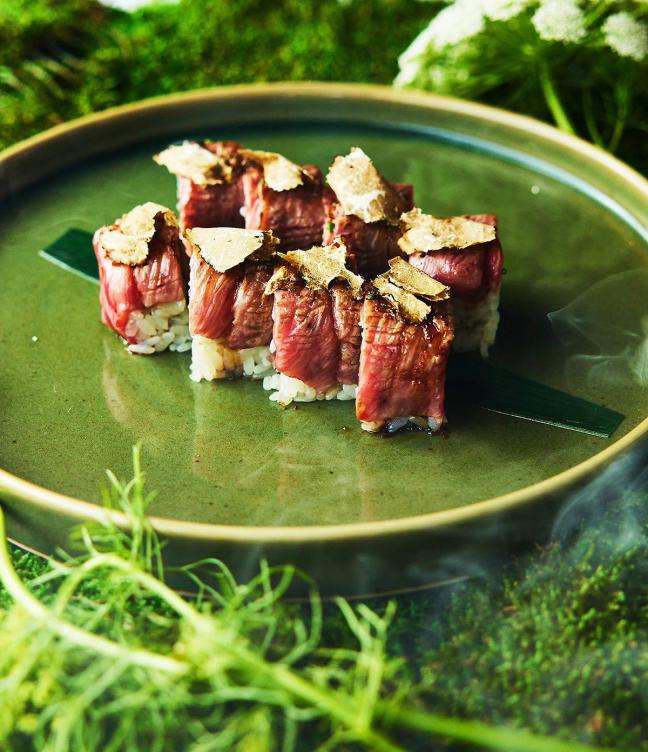
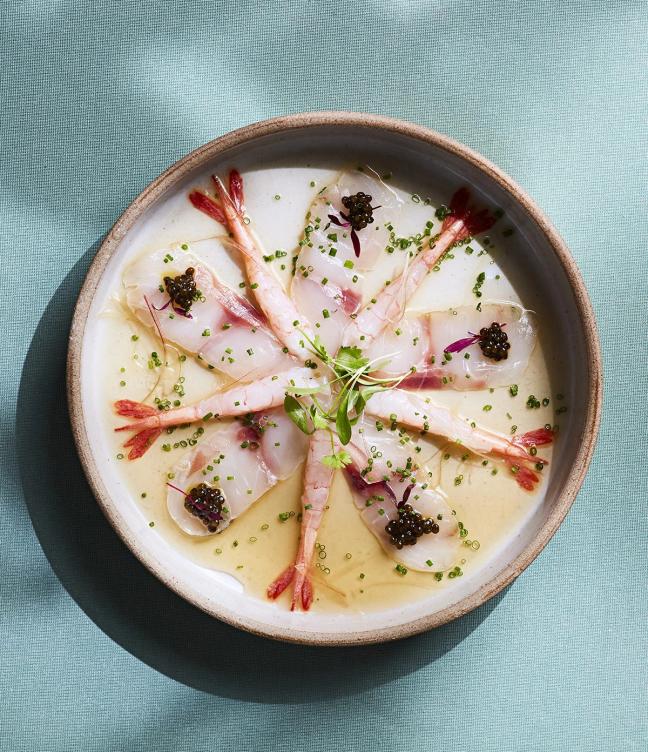
Following a visit to Koyn during its opening, Freddie Janssen, chef of the recently closed Snackbar, Dalston’s answer to LA’s Sqirl, posted an Instagram story that neatly encapsulates the restaurant’s spirit: ‘Good quality proteins and expensive ingredients and you can’t really go wrong’, a dinner whose bill would’ve given her a heart attack had she seen the final tally. Money and fine meat – the commodities that grease the Mayfair streets on which Koyn sits.
The proteins are indeed first-grade – slips of dry-aged, slivery seabass have a clean, briny smack, and are usually served with dabs of oscietra caviar, lightly sweet shrimp and a soy of yuzu dashi; and whole red-mullet tempura, which is tricked out with yuzu kosho tosazu and kombu salt, has an indecipherable, muted umami that refreshes your palate rather than obliterates it – and the prices will have you reaching for your backup Amex when the first one fails. When the glass dome that covers the sushi roll of A5 Wagyu and truffle is removed, the heavy aroma of musty earth, smoked meat and deep expense accounts instantly fragrances the entire atmosphere within a three-table radius; if you have a preference for that sort of thing, it is money well spent.
Umu
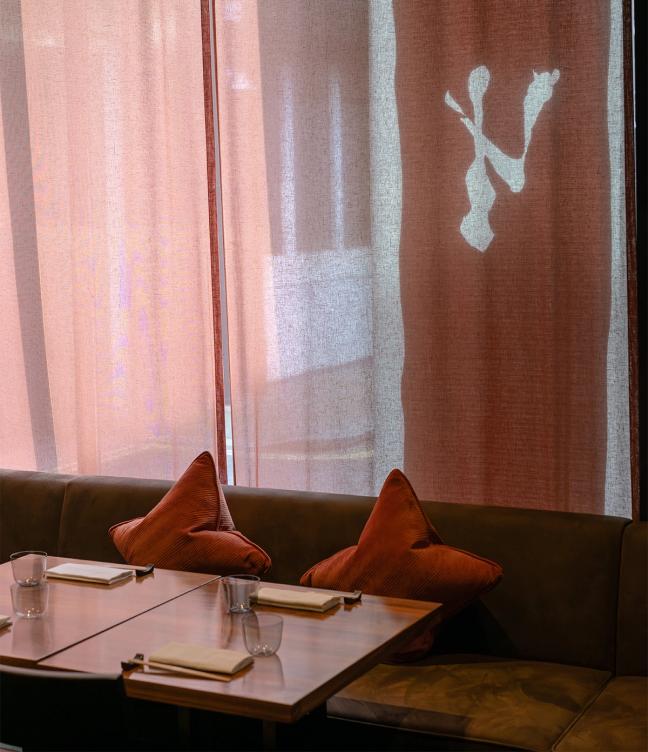
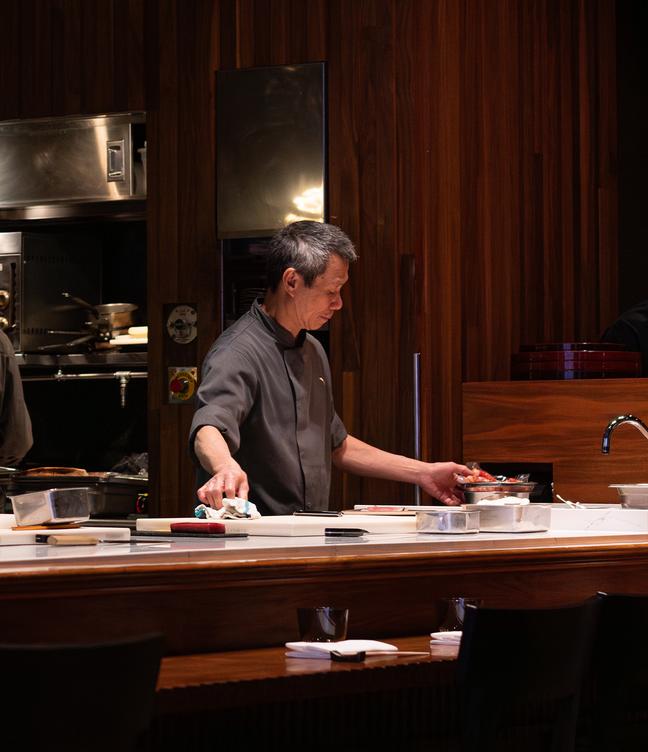
In many ways, stepping into Umu feels like you’ve entered a Japanese counter in its Beverly Hills heyday – monied locals groove right back into the seat they’ve been occupying for years; the chef knows exactly what his favourite regular will crave on the night, the same way in which your barber goes straight to work without asking what you need; the dim lighting creates a sense of Friday-night occasion at all times. There are cases displaying long blocks of fish, all glowing pink and orange and shining under the light. This is a second home to the Mayfair crowd for good reason.
At its very best, the cooking at this luxurious venue whispers with the light grace of kaiseki fare: there might be a small bowl of soup cooked with the sweet flavour of tile fish, ceps, and leeks from Tokyo; the agemono – the deep-fried section of the menu – could star a spring roll of girolles and Cornish lobster; and the eel chawanmushi, depending on the day, might be punctuated with umezu. We insist that you ask for Umenoyado’s yuzu-infused sake whose taste is as smooth and serene as the cooks who work the fish.
“mu”
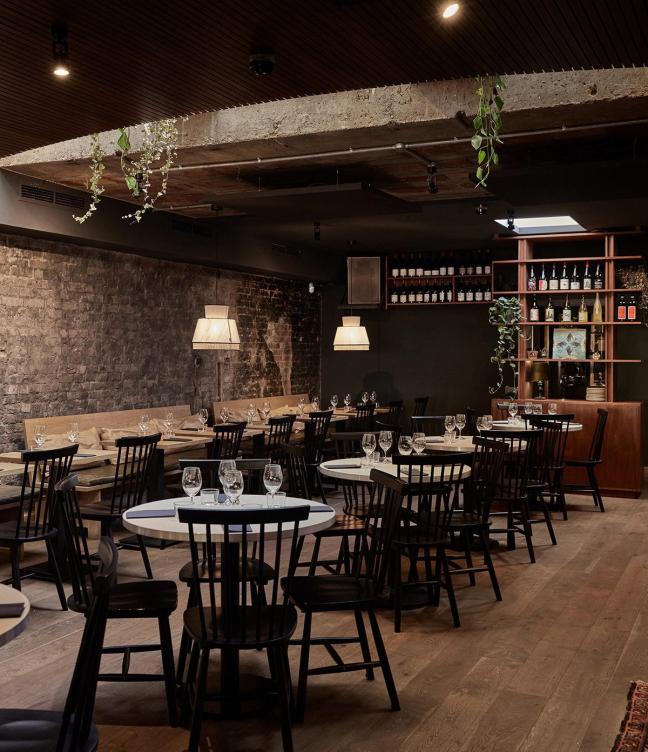
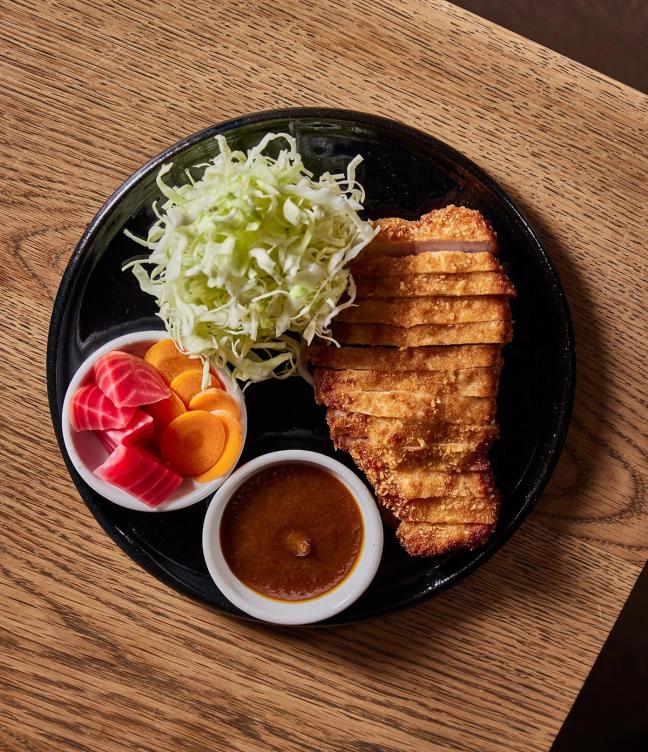
Although izakayas in the motherland are often enlivened by sake-fuelled abandon, there’s a leisurely rhythm to “mu”, the cavernous Dalston hideout where small plates and live music collide, a dimly lit place in which every diner seems to be on a third or fourth Hinge date.
The menu items, which can groove between fried aubergine enhanced by white miso, and cool slivers of yellowtail with yuzu and pomegranate, are the perfect foil for soaking up the excess of sweetened cocktails. If you have thick cutlets of crunchy-chewy pork tonkatsu on the mind, you’ll be just fine.
Mayha
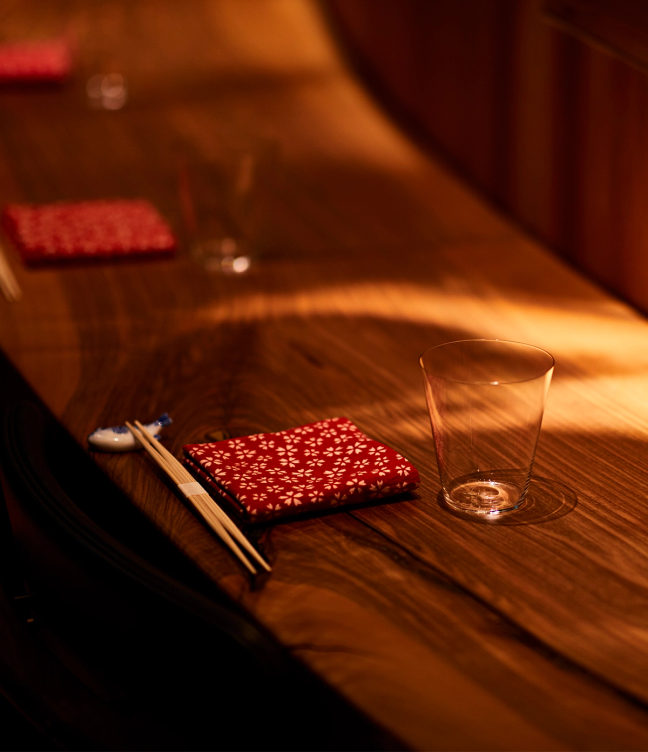
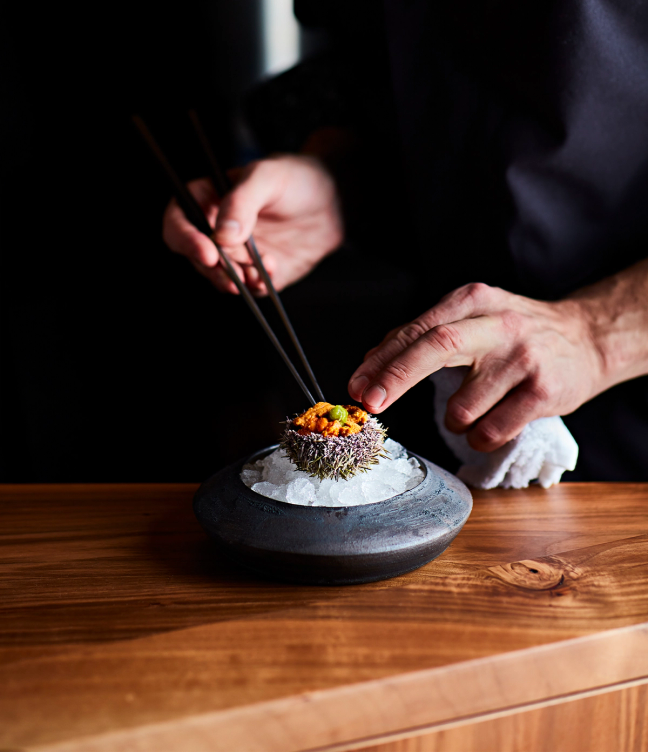
The cooking at Mayha certainly feels as though it eclipses some of the better-known names in town, especially if you consider that its chef, Jurek Wasio, might well be the most generous man on the scene – his insistence to not hold back on serving several gratuitous rounds of o-toro slices and ember-pressed salmon sushi before dessert is a move that lies somewhere in the middle of unsparing hospitality and the act of a baker giving out discount loaves at the end of the day’s trade.
At Mayha, Wasio, with co-chef Yuichi Nakaya, is serving some of the most accomplished omakase at the moment, which is to say that you won’t have to fluster in a blind-panic over the menu, because the pair won’t give you any choice; what arrives in front of you, and at what rhythm, is conducted by them, and even though a meal here showcases the usual measures of this high-style of cooking – a sense of stillness, seriousness and precision – there’s room for freewheeling and imagination, too.
So, the sourdough, first chargrilled and then finely coated with wild-garlic miso butter, is spread heavy with o-toro tartare that’s been chopped up with anchovies, capers, fermented cucumber, and Polish Antonius Caviar; the homemade tofu, folded together with Japanese black-sesame paste and slicked up with a splash of Sicilian olive oil, holds as much weight on the menu as the small mound of bamboo shoots steamed with dashi; and two or three shreds of lobster arrive with cold apple oroshi – grated apple – and a little touch of horseradish aioli, an arrangement that, as soon as you taste it, will sync you into the beauty of the season. Just remember to save room for those sushi handouts.
Want more culinary content? We review Claridge’s Restaurant...

Become a Gentleman’s Journal Member?
Like the Gentleman’s Journal? Why not join the Clubhouse, a special kind of private club where members receive offers and experiences from hand-picked, premium brands. You will also receive invites to exclusive events, the quarterly print magazine delivered directly to your door and your own membership card.
